In 2009, Bitcoin was just an experiment. Today, it is being discussed as a potential national reserve asset alongside gold and the U.S. dollar. As someone who has been deeply sceptical of cryptocurrencies, I believe this transformation demands a serious reassessment.
Bitcoin: An Asset, A Currency, or Just a Fad?
Bitcoin (or cryptocurrency) is not a traditional asset in any sense of the word. It is something that has a very high price today without even having a clear use case. Bitcoin is a digital asset that, like gold, doesn't really do anything practical—and that's precisely what makes it interesting.

What started as a project by tech enthusiasts after the 2008 financial crisis has elevated to industrial-scale manufacturing, investment portfolios, and corporate balance sheets.
Under Michael Saylor's leadership, MicroStrategy has accumulated almost 280,000 bitcoins, representing one of the largest corporate holdings globally. Major financial institutions, including BlackRock, Fidelity, and Goldman Sachs, now offer Bitcoin investment products, marking a significant shift from their previous scepticism.
Here’s what Michael Saylor has to say about Bitcoin:
In a global financial system managing roughly $12 trillion in foreign exchange reserves, Bitcoin's $1.8 trillion market cap is a potential addition to now even nation-states’ Balance Sheets.
Bitcoin as a Store of Value: Beyond Digital Gold
Bitcoin and gold share fundamental characteristics that make them attractive as stores of value. Both are finite resources—gold through geological limitations, Bitcoin through mathematical certainty. While new gold discoveries can unexpectedly increase supply by 1-2% annually, Bitcoin's generation schedule is immutable: only 21 million coins will ever exist, with approximately 19.5 million already in circulation.
This mathematical certainty presents both advantages and challenges for institutional adoption. Unlike gold, which can be debased through increased mining activity or the discovery of new deposits, Bitcoin's supply cap is absolute. This makes it theoretically more resistant to inflation than precious metals. However, there are unique challenges:
Concentration Risk: Approximately 2% of addresses hold 95% of available Bitcoin
Market Volatility: Daily price swings can exceed 5%, compared to gold's typical 0.5%
Bitcoin isn't tied to any country's politics. With traditional reserve currencies like the dollar, you're always at the mercy of one country's decisions. The global power balance can shift, too—ask the British pound how that feels. Bitcoin is a potential way out of these geopolitical games, although there are nuances to that too.
Then, there’s another factor. While governments have more control over mining, storage, and exchange than gold or foreign exchange, cryptocurrencies offer no flexibility.
Central banks have always relied on their ability to adjust the money supply, set interest rates, and influence their economies through monetary policy. Bitcoin strips away these powers completely. No country can create more of it, and no central bank can adjust its supply, making it a hard pill to swallow for policymakers.
But here's where it gets intriguing: this very lack of control might become a necessary feature rather than a bug. When traditional reserve assets can be frozen or devalued by rival powers, having some portion of national reserves in an uncontrollable asset starts making strategic sense. Recent events have shown that even major economies aren't immune to having their foreign reserves frozen or their access to financial systems restricted.
While governments love control over their monetary systems, global politics might force them to embrace something they can't control. Think about this from a strategic angle: China is aggressively accumulating gold and also dominates Bitcoin mining. The US faces a choice: adapt to this new reality and risk losing financial influence, or maintain dollar dominance by ramping up its strategic reserves.
The global money game is changing, and Bitcoin is shaking things up in unexpected ways. While El Salvador's adoption of Bitcoin as a legal tender might seem like a small move, the real story is unfolding in larger economies.
The US political landscape offers particularly striking signals. President-elect Trump has positioned Bitcoin as a strategic asset, arguing that hampering it actually helps competitors like China and Russia. His potential administration includes figures like Elon Musk and Vivek Ramaswamy, both known for their crypto-friendly stances. Ramaswamy's suggestion to include Bitcoin in a basket of commodities backing the dollar isn't just bold—it hints at how traditional powers might adapt to maintain their influence.
The Road Ahead
Given the dynamics of cryptocurrencies, the price of these currencies is an essential indicator of their value. This starkly contrasts traditional assets, which can enter an 'overpriced' zone with a significant rise in prices. The surge in Bitcoin prices over time can indicate its wider acceptance and a further rise in its potential and price. While this may seem counterintuitive, it makes logical sense.
The future of Bitcoin as a reserve asset remains uncertain, but the questions it raises are fascinating. While its potential as a store of value is emerging, it is hard to predict its use as a 'currency' or as a medium of exchange anytime in the foreseeable future.
If policymakers decide to give Bitcoin a prominent role in the global financial system, the impact could ripple through global economies in ways we can't fully predict. Given the established monetary systems and policymakers' preference for control, some might view this as impossible. But history offers an important lesson: what seems impossible often becomes inevitable when circumstances change.
Whether cryptocurrencies will be a successful investable asset remains to be seen. However, what makes this particularly exciting is how it challenges traditional notions of value and control. The unfolding story of Bitcoin isn't just about technology or finance—it's about how the world adapts to new ideas.








